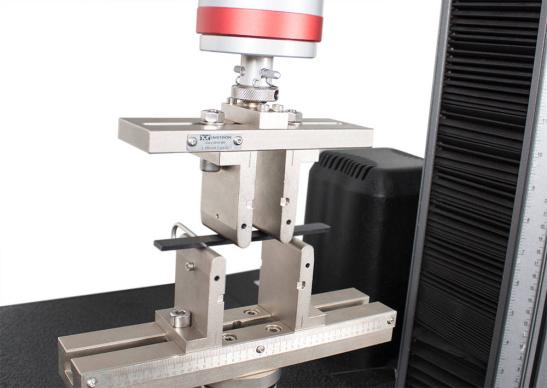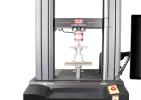ASTM D6272 Flexural Properties of Plastics and Electrical Insulating Materials
ASTM D6272 is a test method for the determinations of flexural properties for unreinforced and reinforced plastics. These materials include high-modulus composites and electrical insulating materials. This flexure test requires a 4 point fixture where the bottom span is set by the span-to-depth of 16:1 ratio, and the top is set at two points equally distant from the center line. The Instron® 4 point flexure fixture is fully compliant with the fixture requirements.
Two test procedures, Procedure A and B are used depending on the material properties. Procedure A is used for brittle materials that break at low deflections. Procedure B is used for flexible, more ductile materials that undergo large deflections. The specimen is deflected until break or until a strain of 5% is reached, whichever occurs first. To accurately measure the deflection, a calibrated device is required that meets the ASTM E83 Class C deflection measuring standard.
The challenges of testing to this standard are:
- Flexural strain measurement
- Repeatability of calculations
- Reporting calculations in compliance with the standard
Instron Solution:
- Flexural strain measurement – ASTM D6272 requires that the method used to measure strain is not influenced by the compliance of the machine. Advanced strain solutions include non-contacting extensometers, such as the Advanced Video Extensometer (AVE 2) and automatic contacting extensometers, such as the AutoX 750. These solutions require little influence from the operator, resulting in improved repeatability. Clip-on extensometers such as 2630-107 or 2630-110 attached to a deflectometer plunger also meet Class C deflection measuring requirements.
- Repeatability of calculations – When setting up the test, having an adequate preload is highly recommended to ensure accurate and consistent strain measurements. The amount of force applied to the specimen prior to starting the test directly impacts the repeatability of calculations, such as flexural modulus. Alternatively, slack correction can be used to ensure that the calculations are performed on the appropriate section of the testing data.
- Reporting calculations in compliance with the standard – Instron Bluehill® Universal testing software has advanced built-in methods available with pre-configured plastic-specific calculations helping to ensure compliance based on the ASTM D6272 standard.
It is important to review ASTM D6272 in order to fully understand the test setup, procedure, and results requirements.
6800 Series Premier Testing Systems Brochure
Instron 6800 Series Universal Testing Systems provide unparalleled accuracy and reliability. Built on a patent-pending Operator Protect system architecture with an all-new Smart-Close Air Kit and Collision Mitigation features, the 6800 Series makes materials testing simpler, smarter, and safer than ever before.
- Products
- 02/10/2020
- 1.93 MB
Bluehill Universal Brochure
Bluehill Universal is Instron’s advanced materials testing software, designed for intuitive touch interaction and streamlined workflows. It offers pre-loaded test methods, QuickTest for rapid setup, enhanced data exporting, and Instron Connect for direct service communication. Users of Bluehill 2 and Bluehill 3 can easily upgrade to the latest version for improved performance and usability
- Products
- 02/26/2017
- 3.76 MB
3-Point and 4-Point Bend Fixture
The 3-Point bend fixture is designed to easily provide the capability of a 3-point flexure test; it is suitable for both Dynamic & Static testing. The specimen is supported on two lower anvils and the load is applied in the centre of the specimen by a single upper anvil. The fixture has a variable span from 18 – 148 mm (0.7 – 5.82 in). The lower part is fitted to the load cell, which should be base-mounted, and the upper part is fitted to the actuator via a flange attachment.
- Products
- 04/10/2016
- 1.11 MB
AVE 2 Non-Contacting Video Extensometer
The second generation Advanced Video Extensometer (AVE 2) utilizes patented measurement technology in the fastest, most accurate non-contacting strain measurement device commercially available.
- Products
- 01/26/2018
- 1.4 MB
Automatic Contacting Extensometer – Model AutoX 750
The AutoX 750 is a high-resolution, long-travel automatic contacting extensometer. It can be mounted onto any electromechanical 3300, 3400, 5500, 5900, or 6800 Series tabletop or floor model system as well as LX, DX, HDX, and KPX static hydraulic testing systems. It is well suited for applications involving plastics, metals, biomedical, composites, elastomers, and more. The AutoX has a maximum travel of 750 mm and accuracy of ± 1 µm.
- Products
- 08/15/2013
- 1.29 MB
2630 Series Strain Gauge Extensometers
The 2630-100 series of extensometers offers speed of attachment and ease-of-use. The light-weight, rugged cross-brace design eliminates errors caused by physical distortion, while built-in protection ensures that damage is not caused by over-extension.
- Products
- 06/03/2013
- 551.73 KB


